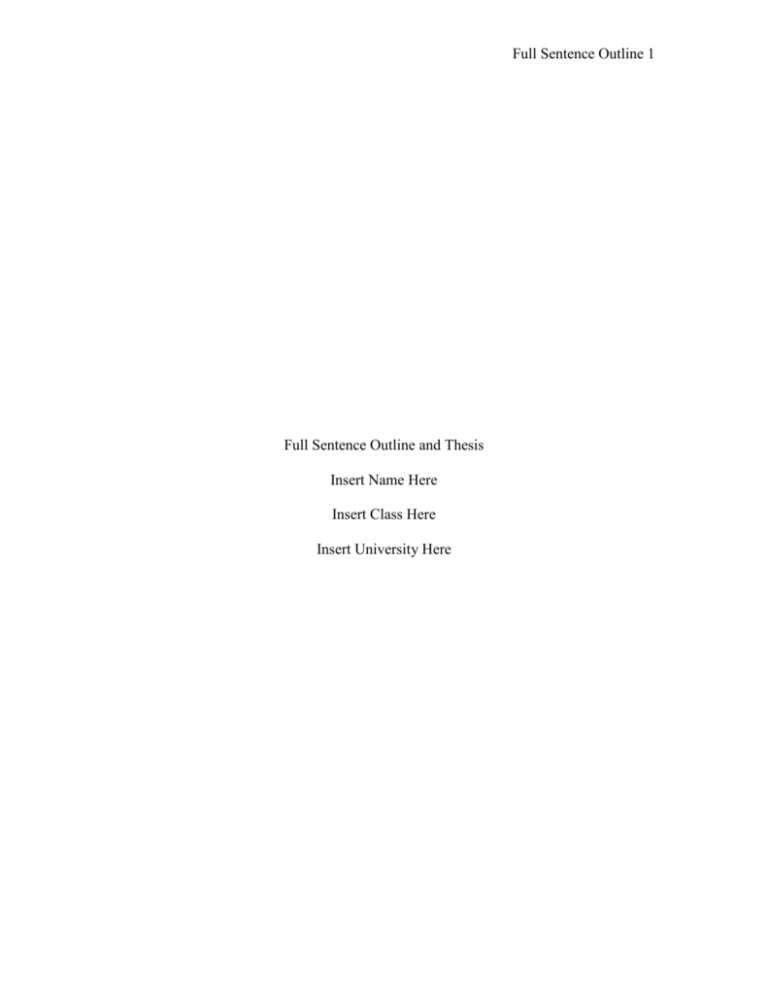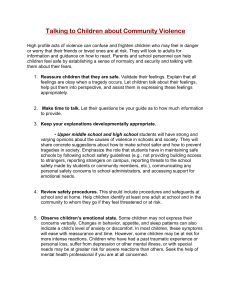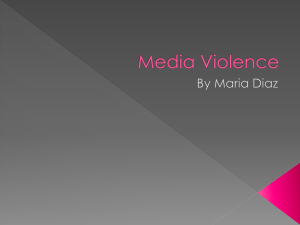Full Sentence Outline and Thesis
advertisement

Full Sentence Outline 1 Full Sentence Outline and Thesis Insert Name Here Insert Class Here Insert University Here Full Sentence Outline 2 Thesis: Some would say that violence is not caused by watching it on television however, it does have an impact on the way society responds to violence and it increases the amount of aggression a person has after watching it on television. I. Violence is supposedly not caused by watching it on television. A. Aggression is increased according to studies, (insert quote here), after watching violence on television. B. “Researchers, they say, have found modest evidence that media consumption contributes to the problem of obesity, modest to strong evidence that it contributes to drinking and smoking, and strong evidence that it contributes to violence,” (Escobar-Chaves, Anderson 2007). II. News coverage desensitizes watchers to violence. A. News coverage of violent events has become common place in today’s society. B. The constant influx of graphic images causes one to become immune to violence and see it as something that is normal and natural and cause little to no repercussion to displays of violence that would have been unacceptable fifty years ago. III. The media uses deception to flavor the incoming images to create a desired response in their audience. Full Sentence Outline 3 A. When the images flash across the screen, we do not realize that those images are not truth but fabrications used to create a desired emotion. B. New productions have done this for a long time to cause their viewers to sympathize with them. 1. According to Beaudoin in his article Culture, Race, and Difference Through a Media Lens, the media shows violence and suffering as a way to control its audience through misrepresentation and gains power in doing so (2008). 2. The media often casts a differ rent light on things to suit their needs, like, “In 2007, […] , when the news media effectively cast these marchers as agents of violence, the peaceful nature and message of the demonstrators was lost on the nation” (Ana, 2009). Where did you place the most effective arguments in your paper? Explain your reasoning. How did you address counterarguments without weakening your own premise? My most effective arguments lie in documented studies showing that the media not only controls what we watch but uses it to create a response in its viewers specifically to create sympathy and raise their own ratings because of it. This takes away from the credibility of the argument that the violence in the media is based in true accounts that we need to know. Also I address the fact that the media is desensitizing us to violence by the constant streaming of violent images into our brain. I document the studies to prove my basis. I addressed the arguments from a standpoint that there are scientific studies to back up my argument. Full Sentence Outline 4 References Ana, O. (2009, January). Framing Peace as Violence: TV Coverage of L.A.'s May Day 2007. NACLA Report on the Americas, 42(1), 52-55. Retrieved February 25, 2009, from MasterFILE Premier Database. Beaudoin, B. (2008, November). Culture, Race, and Difference through a Media Lens. International Journal of Diversity in Organisations, Communities & Nations, 8(5), 145-152. Retrieved February 25, 2009, from SocINDEX with Full Text database. Escobar-Chaves, S., & Anderson, C. (2008, March). Media and risky behaviors. Future of Children, 18(1), 147-180. Retrieved February 25, 2009, from CINAHL Plus with Full Text database. Glascock, J. (2008, June). Direct and Indirect Aggression on Prime-Time Network Television. Journal of Broadcasting & Electronic Media, 52(2), 268-281. Retrieved February 25, 2009. Scharrer, E. (2008, Summer2008). Media exposure and sensitivity to violence in news reports: Evidence of desensitization?. Journalism & Mass Communication Quarterly, 85(2), 291-310. Retrieved February 25, 2009, from Business Source Complete database.









